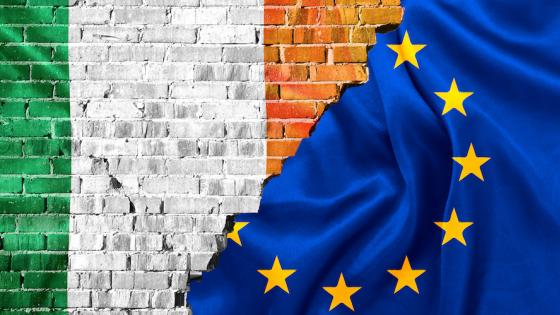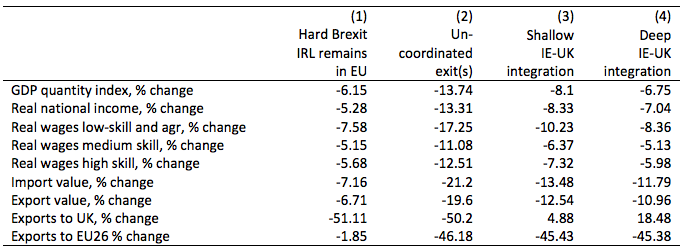Relative to the rest of the EU, Ireland is especially vulnerable to the fallout from Brexit, both economically and politically. With increasing frustration over the situation as Brexit Day approaches, some political pundits (the newly formed Irexit Freedom Party and Brexit champion Nigel Farage) are even suggesting that an Irish exit from the EU would benefit Ireland. A key argument for this is that it would allow for reintegration with the UK, thus allowing close ties with one of its largest trading partners. While this viewpoint is still firmly in the minority, with a European Movement Ireland (2017) poll in April of last year showing that only 16% of Irish support exiting the EU, polls prior to the Brexit referendum and the 2016 US election show that nationalist movements can do much better in the voting booth than such numbers might suggest. In particular, given that Ireland rejected the Treaty of Lisbon in 2008 (before passing it in a second referendum a year later) and a continuing popular belief that austerity following the 2009 euro crisis inequitably impacted the Irish in order to save the currency zone, dismissing the ‘Irexit’ supporters out of hand is unwise.
In a recent paper, we examine the economic arguments for an Irexit as a follow-on to a hard Brexit (Davies and Francois 2018). Working with an Eaton-Kortum based structurally estimated general equilibrium model, we compare remaining in the EU with options ranging from an uncoordinated Irish exit on one extreme to a well-coordinated Irish-UK departure followed by deep Irish-UK integration on the other.
Implications of Irexit
In Table 1, we summarise the macroeconomic impact of a range of scenarios:
- Hard Brexit with Ireland remaining in the EU
- Hard Brexit with an uncoordinated follow-on Irexit
- Hard Brexit, Irexit, and an FTA between Ireland the UK
- Hard Brexit, Irexit, and an Irish-UK customs union
All scenarios imply losses for the Irish economy. At the heart of these losses are the impacts on trade. These follow at least as much from Brexit-related regulatory and border clearance costs as they do from tariffs. As shown in the last two rows of the table, while an Irexit might permit retaining some integration with the UK, this comes at the cost of trade with the EU, which falls by approximately 45%. Even in the best-case scenario, trade diversion to the UK is simply unable to overcome these losses. Furthermore, in each case the fall in wages is most severe for low-skill and agricultural workers (who, perversely, are generally perceived as those most supportive of the current global trend towards nationalism). Note that all of these estimates rest on an assumption that Ireland and the UK (either jointly or individually) are able to maintain their current agreements with the rest of the world. This is unlikely, however, since the US – the largest single trading partner for both Ireland and the UK – is currently engaging in multiple trade wars (including one with the EU). This testy political climate, particularly for Ireland given its small size, suggests that these projections are probably too rosy relative to the likely end result of Irexit.
Making the worst of a bad situation
The bottom line is that any version of Brexit, with or without Irexit, worsens the Irish economic situation relative to the status quo. However, choices made still affect the misery realised. Economically speaking, the best option for Ireland is to stay within the fold of the EU while hoping for and working towards the best in terms of post-Brexit UK economic integration with Europe. Irexit, under all the scenarios we examine, simply makes matters worse. At best, it leaves Ireland with greater economic pain, combined with a likely shift in the control of its economic policy to London. While similar projections for the UK prior to the Brexit referendum were not enough to outweigh Eurosceptic outrage, post-referendum regret suggests that this would not be true today. This points to the need for an informed rather than inflamed Irish debate before it too starts looking for the exit.
Table 1 Macroeconomic impact of Irexit scenarios
Source: Authors' calculations relative to a "no-Brexit" baseline in 2030. All scenarios assume a hard Brexit.
Note: We use the same data and baseline assumptions as in Thelle et al (2018). Technically, our model is an Eaton-Kortum based structurally estimated general equilibrium model (SEGE), as spelled out in Bekkers et al (2018). The model includes linkage of capital stocks to changes in investment. The SEGE framework blends numerical features of a computable general equilibrium model with the econometric features of structural gravity models. See Bekkers et al (2018) for further technical model discussion, and Thelle et al (2018) for further discussion on the characterisation of the hard Brexit baseline.
References
Bekkers, E, J Francois and H Rojas-Romagosa (2018), ”Melting ice caps and the economic impact of opening the Northern Sea Route”, The Economic Journal 128(610): 1095-1127.
Davies, R and J Francois (2018), “Making the Worst of a Bad Situation: A Note on Irexit”, University College Dublin discussion paper.
European Movement Ireland (2017), ”Ireland’s Commitment to EU Membership Undiminished by Brexit”, European Movement Ireland Ref. 161115.
Thelle, M, T Jeppesen, and E Rytter Sunensen (2018), ”Ireland and the Impacts of Brexit”, Copenhagen: Copenhagen Economics.





